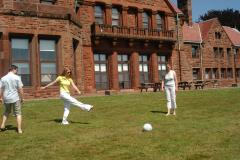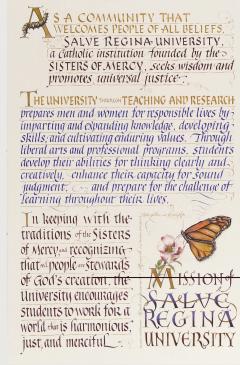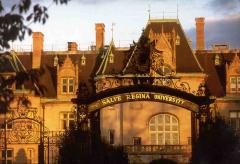|

His Holiness, the Dalai Lama speaks at Salve Regina University, November, 2005. All Salve students study his works as part of the Core Curriculum.
|
|
|
|
Salve Regina University Newport, Rhode Island Salve Regina University offers a liberal education in the Catholic tradition focused on the integration of faith and learning, learning in community, a consistent attention to moral questions, a commitment to service, and a belief in the essential unity of all knowledge. The University offers over 40 concentrations leading to associate and bachelor's degrees, 7 master's degree programs, and a Ph.D. in humanities. Located on a picturesque campus in the historic city of Newport, Rhode Island, Salve Regina is a coeducational university of arts and sciences with an enrollment of 2500 students. The faculty are dedicated to excellence in teaching and committed to bringing out the potential of every Salve Regina student. Individual attention and strong bonds between students and faculty are hallmarks of the university, instilling a sense of community. The University's focus on developing responsible citizens of the world is carried out in the context of the Salve Regina University Core Curriculum, the Honors Program, the Pell Center for International Relations and Public Policy, and a vibrant and growing Study Abroad program.
Salve Regina Website
Click here to visit the Salve Regina University Website
|
|
|
The Salve Regina University Core Curriculum The Salve Regina University Core Curriculum is a four-year course of study in the liberal arts and sciences that is required of all Salve Regina students. The first Core courses were introduced in the fall of 2003 after a three-year period of design and development. Based on an educational philosophy grounded in the University's Mission, the Core is integrated in a variety of ways through its structure, themes, readings and learning goals and objectives, and also by means of a Integrative e-Portfolio. The University's participation in the Integrative Learning Project was focused on completing the process of implementation through the design of a Senior Core Capstone course and the development of an assessment program based on an Integrative e-Portfolio.
Salve Regina University Core Philosophy and Learning Goals
Click here for Salve Regina University Core Philosophy and Learning Goals and Objectives
Structure of the Salve Regina University Core
Click here for the Structure of the Core Curriculum and a list of courses.
|
|

Students at McAuley Hall
|
|
|
|
|
Integrative Learning Project Goals In the fall of 2003, after a three-year design and development period, Salve Regina University began implementation of its new general education program, "The Salve Regina University Core Curriculum: a Program Designed to Develop Lifelong Learners and Responsible Citizens of the World." As part of the Carnegie/AAC&U Integrative Learning Project, Salve Regina University undertook to complete this process of development and implementation by accomplishing two goals: 1. The design, development and implementation of an interdisiciplinary, integrative Core Capstone, a senior level course entitled "Living Wisdom" 2. The design and development of an assessment program based on an Integrative e-Portfolio Both of these projects are designed to enhance integrative learning at Salve Regina, the e-portfolio through guided and intentional reflection on the Core Curriculum goals over the four years of the baccalaureate experience, and the Capstone through summative linkages to other Core courses and themes.
|
|
|
Salve Regina's Integrative Learning Project Team: Dr. Paula Martasian of the Psychology Department; Dr. Stephen Trainor, Dean of Undergraduate Studies; and Dr. Mary Montminy-Danna of the Social Work Department.
|
|

Salve Regina University Mission Statement
|
|
|
|
"True enlargement of mind is the power of viewing many things at once as one whole, of referring them severally to their true place in the universal system, of understanding their respective values, and determining their mutual dependence." John Henry Cardinal Newman
|
|
|

Ochre Court, Salve Regina University
|
|
|
Integrative Learning at Salve Regina In the course of the Integrative Learning Project, faculty identified ten types of integrative experiences at Salve Regina University: Social, Personal, Experiential, Skills-based, Interdisciplinary, Ethical, Cultural, Religious, Structural, and Evaluative.
Ten Types of Integrative Learning
Click here for link to powerpoint presentation on types of integrative learning.
|
|
|
Project Outcomes The design and implementation of the new general education Core Curriculum at Salve Regina has been a major project for the University, beginning in the fall semester of 2000. The formal process used for the development of the new Core was featured in the Fall 2004 issue of Peer Review (Vol. 7, No. 1):
Designing a Signature General Education Program
|
|
|
At the outset of the process, the SRU faculty undertook to design a core curriculum with explicit goals and measurable learning objectives that was to be integrated by cooperation and collaboration. Campus thinking about the assessment goal eventually gravitated toward some type of portfolio (preferably electronic) and the goal of integration ultimately suggested some type of core capstone course. The Integrative Learning Project proved invaluable in bringing to fruition these two major elements of the new Core Curriculum.
|
|
|
Assessment of Core Curriculum: Mapping the Core
Mapping the Core
Click for Process, Timeline, Outcomes and Lessons Learned from Mapping Exercises
Mapping Matrix
A check off box matrix was designed to facilitate the mapping of core goals and objectives to core courses. Faculty teaching the course used this as a work sheet to determine what core goals and objectives were taught and assessed in their courses. Consensus between multiple section courses was arrived at through dialog with faculty teaching the multiple sections.
|
|
|
Core Capstone Course Development
Core Capstone Course
Click here for a description of the Core Capstone
|
|
|